Guitarist Gary Pihl’s musical resume extends back to the 1960’s with the San Francisco band Day Blindness, which opened for notable artists including Janis Joplin, Quicksilver Messenger Service, and Eric Burdon and War. He later joined Sammy Hagar’s band, playing with him from 1977 until 1985 including on the songs “I Can’t Drive 55” and “There’s Only One Way to Rock”.
After Hagar joined Van Halen, Pihl got a call from Tom Scholz from the band Boston to lay down some guitar on the song “I Think I Like It”, which was released on the Third Stage album. This was the beginning of Pihl’s tenure with that band, which continues to this day. Pihl’s guitar can also be heard on the Boston albums Walk On, Corporate America, and Life, Love & Hope.
This interview was for a preview article for noozhawk.com for Boston’s concert on 6/11/17 at the Santa Barbara Bowl. It was done by phone on 5/12/17. (Kamal Asar photo)
Jeff Moehlis: What can people look forward to at the upcoming concert?
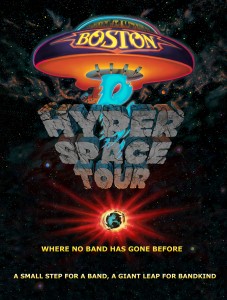
Gary Pihl: This is the Hyper Space Tour, so this is a small step for a band, but a giant leap for bandkind. Tom Scholz, our fearless leader, has invented some brand new visual effects, and written some new music to go along with them. So people are going to hear and see stuff that they’ve never heard and seen at a Boston show before. But we’re also going to play all the old hits that people love to sing along with. And then we’ll be playing some deep cuts, some songs that we haven’t played for a while that we get requests for, and even some new songs from our latest CD, Life, Love & Hope.
JM: How did you first come to join Boston, three decades or so ago?
GP: In 1977, I was playing in Sammy Hagar’s band, and almost one of the first shows I did with Sammy was to open up for the end of Boston’s first tour. Sammy’s manager knew their manager, and we got to open up some shows. They liked us, wed them, and they said, “Hey, you guys can open up the entire second tour for us.” And that’s what we did. From ’78 to ’79 we traveled all around the country as the opening act.
Since I’m an electronics geek myself, I was asking Tom, “So how do you get that sound? What’s this thing over here? How do you make that sound happen?” He was nice enough to tell me what he was inventing and working on, and his guitar set-up.
Then in 1985, when Sammy got the call to join Van Halen, Tom Scholz from Boston called and say, “Hey Gary, I’m working on the Third Stage album. Would you come down and please help me finish it?” And it was a dream come true for me, so I’ve been here ever since.
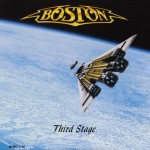
JM: What do you remember about the recording process for Third Stage, when you got involved?
GP: Of course I had known Tom as a perfectionist in the studio, so I was expecting that there would be a very formal sort of process, that he would be standing over me as I did my parts, a micromanager even. I didn’t know what to expect. But then when it came time to do it, he goes, “You know how to record,” since I had my own recording studio, and he said, “Look, I’m going to go upstairs and have lunch.” You know, he had his studio in his basement. He said, “I’m going to have lunch. You just punch in and play your part and go ahead.” So I just did it on my own. I just sat there and put on my part on the tape, and that was it. He probably knew I was as nervous as could be, and it would probably be best if he left the room, which he did. So, yeah, that’s what I remember. But he’s a great guy, and intuitively knew that I’d probably do better if I was on my own.
JM: What’s your favorite Boston song to play in concert?
GP: Of course all the hits are great, because you look out in the audience and people are smiling and singing along. I tell you, there’s no better feeling than that. But I really like playing the song “Walk On”, the title track from the fourth album. That’s a long song, and it’s kind of hard to play, but there’s a point where we all get to improvise during that song, so you never know what it’s going to be like from night to night. That’s a lot of fun to play.
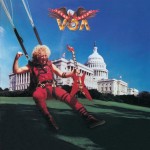
JM: You mentioned that you were in Sammy Hagar’s band. Are there any crazy stories that you’re willing to share from touring or working with him?
GP: No [both laugh]. People ask me, “What’s it like working with Sammy?” and I always say, “He is what you see and what you get.” He’s always in a good mood, a terrific musician – guitarist and singer. It was great working with him those eight years, because he was so enthusiastic. He was the cheerleader of the band. “The next album’s going to be even better, the next tour…” And it was. Every album and every tour was bigger and better than the previous one, and we were sorry to see it end when he got that call from Van Halen.
JM: Maybe you at least tell me, how was it different being in a band with Sammy Hagar from being in a band with Tom Scholz?
GP: Again, Sammy was a great guy, a lot of fun to work with. But Tom Scholz is always on those lists when they put together 100 greatest rock guitarists of all time. Tom always shows up. But he’s also on the list of the 100 greatest keyboard players of all time. There’s nobody else in the world that’s on both of those lists. And then you throw in songwriter – again top 100 songs of all time, there’s always a Boston song or two. He designed and built the amplifiers that we use here on stage. So he’s a real special guy. It’s been my privilege to work with him these thirty-something years.
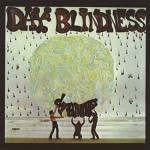
JM: When I looked at your bio, I see that you were in the band Day Blindness, which released an album in 1969. I checked it out and YouTube, and thought the album was pretty cool. Can you tell us a little bit about that band?
GP: Wow! That was a long time ago. I’ll go back even a little further than that, and say that I was in a high school band, and the other guitarist in the band said, “Hey, there’s this guy giving lessons. Let’s head over.” We were teenagers, right, and we said, “We can all take lessons from this guy.” So we went down there, and this guy was real good and was teaching us some cool stuff. He was in a band called The Warlocks, and we even went to see them play at a pizza parlor. And a few months later they changed their name to The Grateful Dead. That was Jerry Garcia, giving us lessons.
JM: What did you learn from him?
GP: He was teaching us some cool riffs. Of course, at that point we said, “Teach me how to play like Keith Richards [laughs] from The Rolling Stones.” Because we thought that Keith was just the coolest. So Jerry was showing us the bluesy kinds of styles like that. So we definitely learned something.
So that’s part of my upbringing, and so when I got to Day Blindness I tried to use some of those skills that I learned from Jerry, and just kept going from there.
JM: I read that Day Blindness got to play some shows with some cool bands in the Bay Area. What was the highlight for you?
GP: We went to Hawaii, actually, to do some gigs over there, and got to open up for Janis Joplin. That was a thrill to see her live onstage, because she was a powerhouse. But we also opened up some shows for Quicksilver Messenger Service, if you remember them, Strawberry Alarm Clock, Eric Burdon and War, when he was with them. So, yeah, it was great to be on some of those shows and see those bands back then.
JM: What advice would you give an aspiring musician?
GP: I often tell musicians exactly what my dad told me. You know, after high school my dad wanted me to go to college, and I said, “Well, but Dad, I just want to be in a rock band.” He said, “Do whatever you want to do” – he didn’t say “I want you to be a lawyer or a doctor”, or something else. “Do whatever you want to do, but go to school to learn how to do it.” I said, “Well, they don’t teach rock ‘n’ roll in college.” He said, “No, but they teach music, and you should learn about it.” So I said, “OK”, and I enrolled in a local school, and I loved it. It wasn’t because the teachers were so hip, but they were so enthusiastic about music that it was infectious. And in one of my classes I happened to be sitting next to Johnny Colla, who went on to play sax in Huey Lewis and The News. You never know who you’re going to sit next to in school. So that’s my advice.
JM: What are your future musical plans, either in Boston or otherwise?
GP: Actually, I’ve got a charity band on the side, that I do during November and December – it’s called December People – where we play traditional holiday songs but in the styles of other classic rock bands. So we’ll do “White Christmas” as if Billy Idol were doing “White Wedding”. And “Santa Claus is Comin’ To Town” like ZZ Top. It goes on and on – The Who and Journey and Led Zeppelin and AC/DC, but again, as if those bands were playing holiday songs. So it’s a lot of fun, and every show we do is a benefit for a local food bank. So it’s a great thing that we can do that at that time of year.
JM: What about with Boston? Of course you’re in the midst of a tour now, but is there any talk about doing another album maybe?
GP: You know, Tom is always writing songs, as are the rest of us. So we’re always working on new material. So you never know. I hate to make any promises, but Tom is a creative guy, and he’s always working on new stuff.

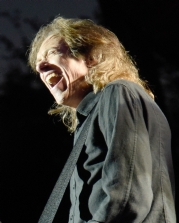
Discussion
No comments for “Interview: Gary Pihl”